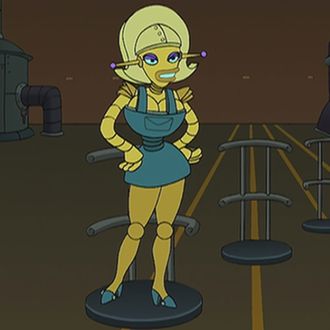
Sex robots: They’ve long been a cherished and/or creepy part of science fiction, but we’re increasingly inching toward a day when they’re cheap and technologically advanced enough to provide a decently viable facsimile of the real thing. When that happens — and Gizmodo notes that thousands of people have preordered a $7,000, supposedly advanced sex robot named Roxxxy — what will it mean for traditional notions of sex and human connection?
Doctors Kathleen Richardson and Erik Billing, a pair of researchers with backgrounds in robotics, anthropology, and cognitive science, are very worried about what sex robots will mean for humanity, and they’ve formed an organization called Campaign Against Sex Robots to help spread the word.
Here are some of their concerns:
We believe the development of sex robots further objectifies women and children.
The vision for sex robots is underscored by reference to prostitute-john exchange which relies on recognizing only the needs and wants of the buyers of sex, the sellers of sex are not attributed subjectivity and reduced to a thing (just like the robot).
The development of sex robots and the ideas to support their production show the immense horrors still present in the world of prostitution which is built on the “perceived” inferiority of women and children and therefore justifies their uses as sex objects.
We propose that the development of sex robots will further reduce human empathy that can only be developed by an experience of mutual relationship.
We challenge the view that the development of adults and child sex robots will have a positive benefit to society, but instead further reinforce power relations of inequality and violence.
We take issue with those arguments that propose that sex robots could help reduce sexual exploitation and violence towards prostituted persons, pointing to all the evidence that shows how technology and the sex trade coexist and reinforce each other creating more demand for human bodies.
For the most part, these aren’t logically coherent points. What does it even mean to say that the development of sex robots “show[s] the immense horrors still present in the world of prostitution”? Lots of technologies reflect human needs and behaviors that are, in other domains, satisfied or expressed in unethical or exploitative ways. No one is arguing that we shouldn’t build cranes because they “show the immense horrors” of slave labor, because that would be a silly thing to say. (As for the idea of child sex-robots, selling them will be illegal anywhere child pornography is illegal, anyway.)
But rather than rebutting these arguments, it’s probably more useful to put the overarching idea behind them into the broader context of moral panics over sexual behavior. It seems like every time something new or seemingly new comes about in the realm of sexuality — unaccompanied women going out with men they’re interested in, mainstream acceptance of masturbation, mobile-app matchmaking, or whatever else — the same thing happens: A small group of people insists that this innovation will fundamentally alter or cheapen traditional patterns of romance and sex, and/or exacerbate various human pathologies. Then, inevitably, the innovation in question does change things in certain ways, but by no means does it topple over the old order — which, remember, was itself a constantly shifting thing with porous boundaries. People still get married and have kids, society doesn’t crumble, life goes on despite the prevalence of internet porn, or whatever. (Moira Weigel recently captured this dynamic really nicely in a New Republic piece about the recent history of panics over dating.)
In the case of this panic about sex robots, perhaps the authors’ most dire claim is that the machines “will further reduce human empathy that can only be developed by an experience of mutual relationship.” But the argument is too familiar to be scary.

